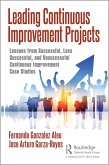The first reason for our frequent inability to sustain the initial gains of lean startups is a misunderstanding of the Japanese term "kaizen mind." Many mistranslate it as a "hunger" for business efficiency and cost reduction. In fact, kaizen mind is a psychology of "mindfulness" joined with "creativity." And once evoked by a sensei, it can be applied (without training) when a leader mandates that employees and managers solve quality problems and redesign the work together.
The second reason is our need to develop new change leaders who know "the way." A sensei immerses prospects in a series of challenges until they learn to do the work of change with the mind of a leader, that is, from the states of presence, flow, and compassion.
Lasting organizational transformation becomes possible, even inevitable, when its leaders learn the five keys and realize "one big thing" in the Sensei Way.
Dieser Download kann aus rechtlichen Gründen nur mit Rechnungsadresse in A, B, BG, CY, CZ, D, DK, EW, E, FIN, F, GR, HR, H, IRL, I, LT, L, LR, M, NL, PL, P, R, S, SLO, SK ausgeliefert werden.
-- Kiyoshi Suzaki, author of The New Shop Floor Management and Results with a Heart
Wow. In this great book you will benefit from a clear understanding of lean thinking, leadership, and states of being. It's like hanging out after work, a nice combination of compelling stories, deep learning, Zen and the Sensei Way.
-- Kevin Coray, PhD. Extraordinary Teams Partnership
In The Sensei Way at Work, Dan shares a fresh perspective and a treasure of historical anecdotes, vivid teaching that enables the reader to grasp the value and practice of the Lean Sensei.
-- Michael Orzen, co-author of the Shingo Prize-winning book Lean IT
It has been 25 years since Lean Thinking was published, and many enterprises are struggling to create a work culture like Toyota's. Is there a secret Toyota hasn't shared? There isn't one. Problem is, to the western management mind, the critical element simply isn't recognizable. It's executives and managers with Kaizen Mind who lead, teach and coach continuous improvement. In The Sensei Way at Work, Dan Prock provides a detailed guide to the ways of being, thinking, practices and skills that leaders must develop both in themselves and in employees that make continuous improvement a way of doing business. Creating a culture of continuous improvement can't be delegated. It has to be led, and this book gives an engaging and enlightening description of how to and by whom.
-- David Verble, former Human Resource Development Manager, problem solving teacher, and coach at North American Toyota; Partner, the Lean Transformations Group.
The Sensei Way At Work isn't just another spin on "lean." It offers great insight on why something so conceptually simple is so challenging to sustain. The challenge is developing leaders with a low-ego, observant, ongoing curiosity, and who become sensei for others.
-- Robert W. "Doc" Hall, founding member of the Association for Manufacturing Excellence; judge for IndustryWeek Magazine's Best Plants Program; Chairman, Compression Institute.









